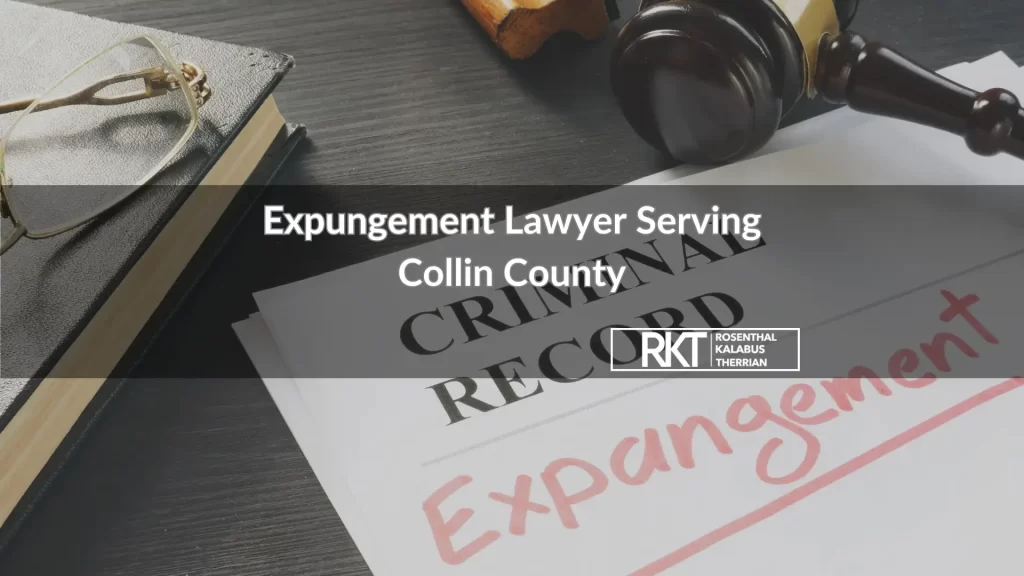
A criminal record can have consequences that follow a person for years. This is true even if an arrest doesn’t lead to criminal charges. Or if the criminal charges are dismissed or result in a finding of not guilty. Fortunately, the law in Texas allows someone who has been arrested or charged with a crime but was acquitted of that crime to eliminate that arrest or charge from their record in a process known as expungement. Many people believe that it is always possible to expunge a conviction. But that is not the case. In some cases, it is possible to seal a conviction record with an order of non-disclosure effectively.
However, Texas law only permits the expungement of an arrest record or a record of a criminal charge that does not result in a finding of guilt. This usually happens when the charge is dismissed or the defendant is acquitted after trial). The law also permits the expungement of a Class C misdemeanor (and only Class C misdemeanors) that results in a deferred adjudication after the defendant completes their community supervision.
Benefits of Obtaining An Expungement
If you successfully obtain an expunction of your arrest or criminal charge record, you may lawfully deny that you were arrested or charged for that crime or that you obtained the order for it (except in rare circumstances). Many employers, schools, landlords, and banks ask you to disclose whether you have ever been arrested or charged with a crime. Therefore, obtaining an expungement can be a powerful tool for clearing your name. It enables you to avoid the long-lasting negative consequences of an arrest record. This is especially true since you were never convicted of a crime.
If you are seeking an expungement of your arrest or criminal charge record, contact the dedicated and experienced Collin County expungement attorneys of Rosenthal Kalabus & Therrian to schedule a confidential consultation with a knowledgeable criminal defense lawyer from our firm. We can advise you on your possible expunction rights and options. We’ll discuss how our firm can provide you with the resources to obtain an expungement of your record successfully.
Do I Need an Expunction Lawyer?
Although hiring an attorney if you wish to petition for expungement of your arrest or criminal trial records is not required, having an experienced attorney on your side may increase the chances of successfully obtaining an expunction of your records. For example, an attorney can review the facts and circumstances of your case to determine whether you are even eligible to receive an expunction of your records. An attorney can also help you draft and assemble your petition to ensure no required information or documents are missing from your request. If you have legal representation, the court may not even require you to appear for the hearing on your petition, allowing your lawyer to appear in your place, which can be helpful if you no longer live in the area or cannot get time off from work.
In circumstances where the prosecutor can object or must consent to a petition for expunction, having an attorney may be crucial to successfully obtain an expunction of your record. A lawyer can craft and present a compelling and persuasive argument in favor of expunction, responding to the prosecutor’s arguments against expunction and addressing any concerns brought up by the court.
Why Choose Rosenthal Kalabus & Therrian to Handle My Case?
If you are seeking an expungement of your arrest record or criminal charges that were dismissed or that you were acquitted for, having dedicated, experienced legal representation on your side can make the expunction process much smoother and increase the chances of having your record successfully expunged. The criminal defense attorneys of Rosenthal Kalabus & Therrian have earned our reputation as the leading criminal defense law firm in Collin County. We are the largest criminal defense law firm in Collin County and the only criminal defense law firm with two Criminal Law Board Certified partners. This means that our partners have obtained board certification, granted to only 1% of attorneys in Texas, by demonstrating and being tested on their substantial experience and knowledge in criminal law.
As a result, Rosenthal Kalabus & Therrian can offer you many resources as you pursue the expungement of your record. When you hire us to help you through the expungement process, you receive the assistance of multiple experienced criminal defense attorneys who will collaborate to develop the most effective and persuasive strategy for your case. We provide experienced legal representation and will fight to have your criminal records expunged.
Types of Cases We Handle

The expunction attorneys of Rosenthal Kalabus & Therrian have helped clients across Collin County seek an expungement of their arrest and trial records for many different kinds of criminal charges that do not result in a finding of guilt, including:
- Homicide
- Assault and battery
- Sex crimes
- DUI
- Theft
- Burglary
- Robbery
- Drug crimes
- Weapons offenses
- Criminal traffic offenses
- Class C misdemeanors that result in a deferred adjudication
Our experienced expunction attorneys can review the circumstances of your case to advise you as to whether you are eligible for expunction. Contact us today to learn more about your rights and options and how our firm can provide you with legal representation to help you through the expunction process.
Frequently Asked Questions about Expunction
Who is eligible for an expungement of their criminal records?
Under Texas law, you are eligible for an expunction of an arrest or trial record for any charge that did not lead to a finding of guilt. This includes a dismissal of the charges or an acquittal at trial. This also goes for any class C misdemeanor that resulted in a sentence of deferred adjudication where you completed your community supervision. Juvenile offenses are also eligible for expunction if they were convicted for misdemeanors punishable by fine. Offenses under the Alcohol Beverage Code. Or a conviction for failure to attend school. In other circumstances, your record is not eligible for expungement but may be eligible for a non-disclosure order.
What is the process?
Expunction involves filing a petition or application with the court in the county where you were arrested or charged. You must also pay a fee along with your petition. But you can request the fee be waived if you can prove you cannot afford the fee. The clerk of the court will schedule a hearing on your petition. During that hearing, the court will review your case to determine your eligibility for expungement. Prosecutors or other interested parties are entitled to object to your request if permitted by law.
Once I file an application is it automatically granted?
No. The court must review your record to determine whether you are eligible for an expungement under Texas law. Under certain circumstances, the prosecutor or other interested parties may be entitled to object to your request. The court will give those objections due consideration.
Can I seek an expungement of my record if I already received an order of non-disclosure?
No. In most circumstances, if a case is eligible for an order of non-disclosure, it is likely not eligible for expungement. For example, convictions may be eligible for an order of non-disclosure but do not qualify for expungement.
Is there a waiting period before I can seek an expungement of my record if my charges were dismissed?
Generally speaking, there is a waiting period if you wish to seek an expungement of an arrest or charging records for ultimately dismissed charges. The waiting period, measured from the date of arrest or the date of the criminal incident, is two years for misdemeanors and three years for most felonies. The most severe felonies can have a longer waiting period before you can seek an expunction of that charge.
If I obtain an expungement, am I obligated to disclose my arrest?
You are legally entitled to deny your arrest if you receive an expungement. This is true unless you are under oath in a court proceeding regarding the arrest. However, even if you are legally required to disclose your expunged record, you are also entitled to explain that the arrest or charges were expunged from your record.
Contact a Collin County Expunction Attorney
If you were arrested, but no charges were filed against you, or you were charged with a crime but were found not guilty, you may be entitled to an expunction of your arrest and trial records. An expunction of your records can mean you no longer have to deal with the consequences of an arrest or criminal charge record. Criminal records can impact your ability to seek employment, education, housing, and other necessities.
The Collin County expunction attorneys of Rosenthal Kalabus & Therrian are ready to help you determine if you are eligible to seek an expunction and help you obtain an expunction of your criminal records. Contact us today to speak with a knowledgeable expunction attorney who can advise you as to your rights and options as to expunction. Plus, you’ll learn how our firm can provide you with the assistance and resources you need to obtain an expungement of your record. Call (972) 369-0577 or contact us online for a free, confidential consultation.